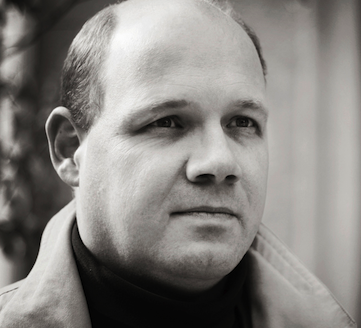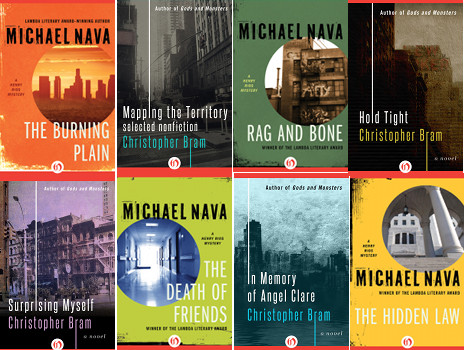Author2Author: Tiffany Baker & Ron Irwin
When Ron Irwin and Tiffany Baker realized that they had rowing in common as well as novel writing, it made sense to them that they’d ask each other a few questions about both topics. Baker is best known, perhaps, as the author of The Little Giant of Aberdeen County, but she has a new novel, Mercy Snow, on the way in early 2014. Ron Irwin’s debut novel, just published, is Flat Water Tuesday.
 Tiffany Baker: Rowers are notoriously competitive and obsessive. The sport pushes you to your limits, and forces you to confront all your fears and faults. You do such a good job of showing that psychological aspect of the sport in Flat Water Tuesday. I know what a profound impact rowing has had on my work and my life in general, and I’m curious what kinds of parallels you would draw between the art of writing and the sport of rowing? If you were going to say rowing was a metaphor for anything in life, what would it be? And do you still row now?
Tiffany Baker: Rowers are notoriously competitive and obsessive. The sport pushes you to your limits, and forces you to confront all your fears and faults. You do such a good job of showing that psychological aspect of the sport in Flat Water Tuesday. I know what a profound impact rowing has had on my work and my life in general, and I’m curious what kinds of parallels you would draw between the art of writing and the sport of rowing? If you were going to say rowing was a metaphor for anything in life, what would it be? And do you still row now?

Ron Irwin: I row occasionally but felt that I was finished with the sport after the final race of the season in college. I had rowed for eight years, progressed as far as I knew I was going to go, and the sport had brought me many friends and many adventures. I had rowed in many of the major U.S. cities and had won plenty of medals. I was ready to ask myself what was next. That said, I was just back at my former boarding school, Kent, and rowed with some old friends, and felt the old thrill.
Rowing is a double edged sword to a writer. On the one hand, it teaches you discipline and directness of purpose. It teaches you to ignore failure and to focus. These things are crucial for a writer. Legendary Harvard coach Harry Parker, who died recently, once pointed out that there is very little flair in rowing; it is just essentially “hard work” and I feel that writing is much the same. Persistence really pays in this business. I would say that one of my best qualities as a writer is my ability to doggedly follow an idea to the end.
8 July 2013 | author2author |
Author2Author: Michael Nava & Christopher Bram

The folks at Open Road approached me recently and told me about how they were re-releasing the work of two great writers, Michael Nava and Christopher Bram, in ebook editions, and that the pair happened to be friends who might likely come up with an excellent exchange for an Author2Author feature. Well, I was familiar with some of Bram’s work as both a novelist and literary historian—in 2012, I reviewed Eminent Outlaws, his survey of 20th-century gay American literature—so while the two of them were formulating their questions and answers, I got hold of Nava’s first novel, The Little Death, and Bram’s debut, Surprising Myself, and started to bring myself up to speed. Of course, I couldn’t read everything that quickly… but I’m certainly looking forward to getting there over time.
Michael Nava: So, Chris, our first novels were both published in 1986 and here we are, like characters out of that Elton John song, “Talking Old Soldiers.” You know the one I mean? “I remember oh it’s years ago I’d say / I’d stand at that bar with my friends who’ve passed away / And drink three times the beer that I can drink today.” Or maybe like the movie queen in Sondheim’s Follies, belting out, “I’m still here!”

Christopher Bram: You’re right. It’s amazing we’re both still writing two and a half decades later. Maybe because we have so much to say? Neither of us has run out of things we need to talk about.
You write mysteries, but your Henry Rios novels are about so much more than solved crimes. Henry is a defense attorney and each novel he narrates functions as a mystery, with all the virtues of the genre. They are tightly constructed, cleanly written, full of smart details and expert dialogue. They are completely involving. But taken together, the seven novels form something much bigger, a large-scale moral portrait of one man’s life over fifteen years. We see Henry with his family, his boyfriends, his professional colleagues. We witness him dealing with AIDS, corrupt politicians, alcohol, and grief. He is that rarest of literary accomplishments: a plausible good man. I believe he is one of the great characters in recent American literature.
When you wrote your first Henry Rios novel, The Little Death, did you think it was only a one-shot work or were you already thinking of someone you’d live with for a long time? Did you plan Henry’s growth or just let it happen? Were you surprised at where he went?
24 June 2013 | author2author |

 Our Endless and Proper Work is my new book with Belt Publishing about starting (and sticking to) a productive writing practice.
Our Endless and Proper Work is my new book with Belt Publishing about starting (and sticking to) a productive writing practice. 
